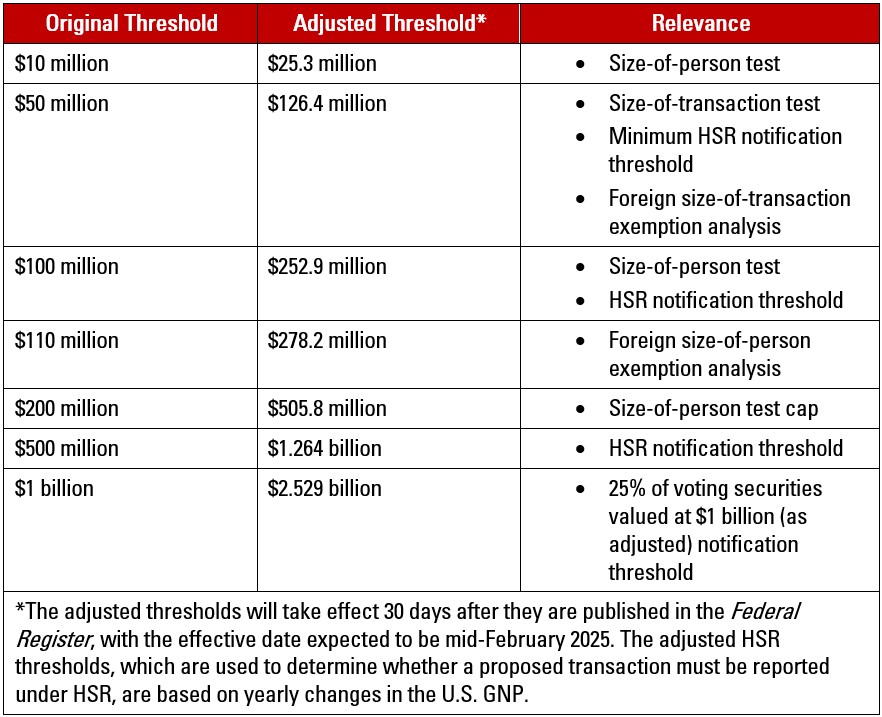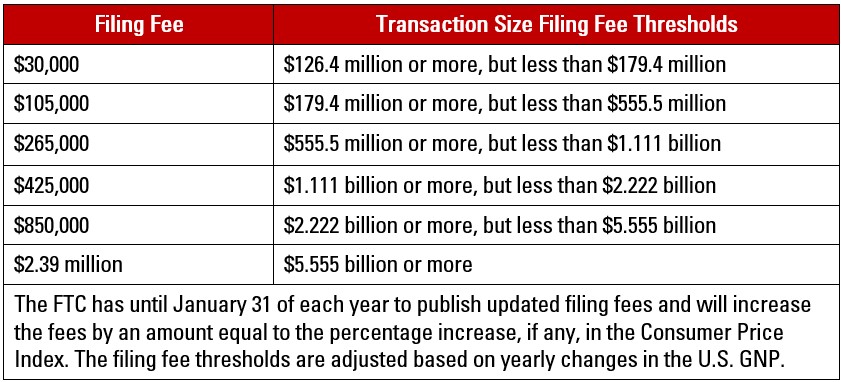The size-of-transaction threshold under the Hart-Scott-Rodino Act will increase to $126.4 million, and the largest filing fee will increase to $2.529 million.
As a result of the increase in the U.S. Gross National Product (GNP) for 2024, the Federal Trade Commission (FTC) has announced an increase in the jurisdictional filing thresholds for the Hart-Scott-Rodino Antitrust Improvements Act of 1976 (HSR). The minimum size of transaction threshold will increase by $6.9 million, a 5.8% increase, to $126.4 million. The thresholds determine whether parties involved in proposed mergers, consolidations, or other acquisitions of voting securities, assets, or unincorporated interests must notify the FTC and the Antitrust Division of the Department of Justice (DOJ) of a proposed transaction and comply with a mandatory waiting period before the transaction may be consummated. The revised thresholds will take effect 30 days after they are published in the Federal Register, with the effective date expected to be in mid-February 2025. Until then, the current $119.5 million threshold is still in effect.
HSR Thresholds Increase. Generally, a transaction will not be reportable under the new thresholds unless it is valued for HSR purposes at more than $126.4 million. If the value of the proposed transaction is greater than $126.4 million but not greater than $505.8 million, the transaction will not be reportable unless the “ultimate parents” of the acquiring and the acquired entities also meet a certain minimum “size-of-person” test—in most instances, where one ultimate parent (including all entities it controls) has net sales or total assets of at least $25.3 million and the other has net sales or total assets of at least $252.9 million. Where the jurisdictional tests are met, the transactions are reportable unless an exemption applies. The table below includes the original and the newly adjusted figures for each relevant HSR threshold. (The original figure continues to appear in HSR regulations with the words “as adjusted” to remind the reader that the thresholds are adjusted each year.) Parties should be mindful that there are many other factors that impact whether a given transaction is subject to the jurisdictional thresholds in addition to these dollar thresholds.

HSR Filing Fees. The filing fees for reportable transactions will be as follows:

Revised Thresholds for Interlocking Directorates. Section 8 of the Clayton Act generally prohibits companies that compete with each other from having interlocking memberships on their corporate boards of directors. The FTC annually revises the jurisdictional threshold that triggers the interlocking directorate prohibition. The annual revisions to the threshold are based on the change in the gross national product and are effective upon publication in the Federal Register.
- Section 8(a)(1) of the Clayton Act prohibits a person from serving as a director or board-elected or board-appointed officer of two or more corporations if the combined capital, surplus, and undivided profits of each of the corporations exceeds $51,380,000.
- Section 8(a)(2)(A) of the Clayton Act exempts interlocks for which the competitive sales of either corporation are less than $5,138,000.
- Note that the statutory exemptions contained in Sections 8(a)(2)(B) and (C), which exempt interlocks when (i) the competitive sales of either corporation are less than 2% of that corporation’s total sales or (ii) the competitive sales of each corporation are less than 4% of that corporation’s total sales, remain unchanged and are not revised on a yearly basis.
As these changes take effect in early 2025, companies should be aware of the updated thresholds as they consider proposed mergers, acquisitions, and similar transactions or changes in the composition of their corporate boards or senior officers.
[View source.]